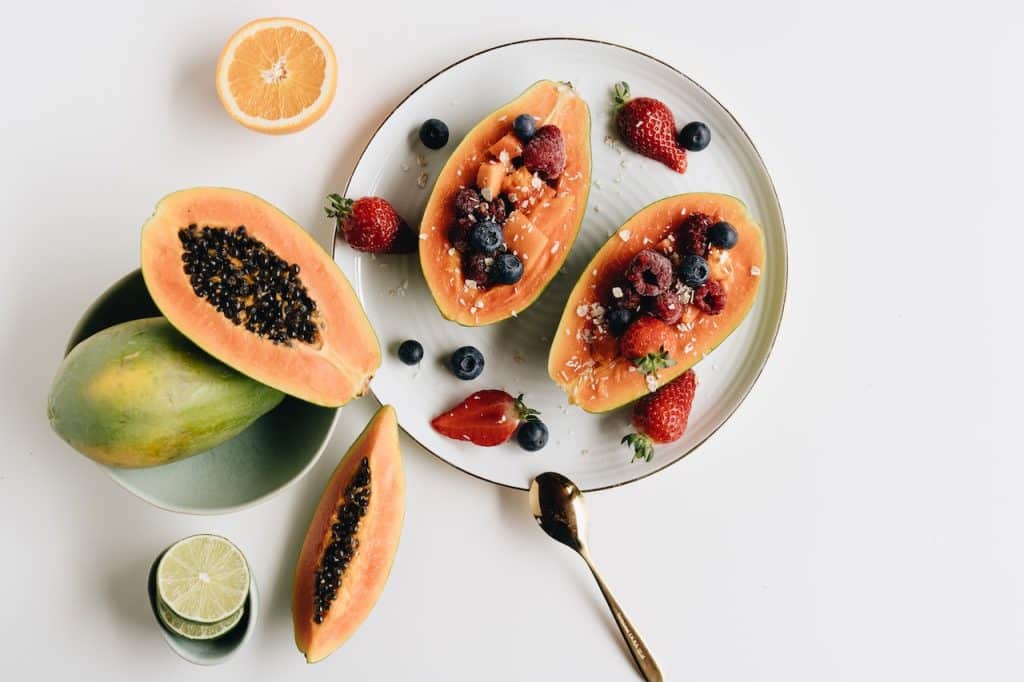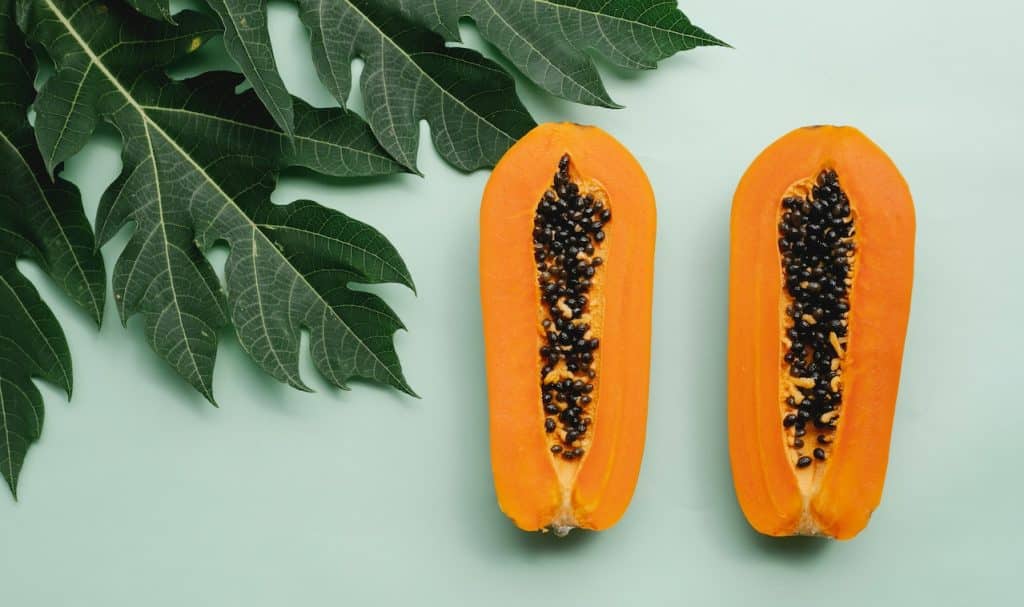The ketogenic diet has become increasingly popular in recent years as a way to lose weight and improve overall health. This low-carb, high-fat diet requires careful attention to the types of foods that are consumed, as certain fruits and vegetables that are high in carbohydrates can impact ketosis and disrupt weight loss efforts. One such fruit that has raised questions is Papaya. Is papaya keto-friendly or not? In this article, we will explore the nutritional profile of papaya and determine its compatibility with a ketogenic diet. By examining the carbohydrate, fiber, sugar, protein, and fat content in papaya, we will determine its impact on blood sugar levels, ketosis, and whether or not it can fit into a ketogenic meal plan.
What is Papaya?

Papaya is a tropical fruit that is native to Central America and southern Mexico but is now widely grown in many other countries including India, the Philippines, and South America. Papaya is a large, oblong-shaped fruit that is typically between 7 to 20 inches long, and weighs anywhere between 1 to 10 pounds. The fruit’s flesh is a vibrant orange color, and it has a soft, juicy texture with a sweet and slightly musky flavor. Papaya is often referred to as a “superfood” due to its high nutrient content and numerous health benefits.
Read More: Is Honeydew Keto Friendly?
Nutritional Value of Papaya
Papaya is rich in vitamins, minerals, and antioxidants, making it a nutritious addition to any diet. One cup of papaya contains approximately:
- 120% of the daily recommended value of Vitamin C
- 11% of the daily recommended value of Vitamin A
- 6% of the daily recommended value of potassium
- 2% of the daily recommended value of folate
- 2% of the daily recommended value of fiber
- Small amounts of magnesium, calcium, and phosphorus
Common Uses of Papaya:
Papaya is a versatile fruit that can be used in a variety of ways. Here are some of the most common uses of papaya:
- Eating fresh: Papaya is often eaten raw, as a healthy snack or added to smoothies, salads, and other dishes.
- Cooking: Papaya is sometimes cooked and used in savory dishes, particularly in Caribbean and South Asian cuisine.
- Skincare: The high concentration of enzymes and antioxidants in papaya makes it a popular ingredient in skincare products.
- Medicine: In some cultures, papaya is used for its medicinal properties, including as a digestive aid and to treat skin conditions.
In conclusion, papaya is a nutritious and delicious fruit that can be enjoyed in many different forms. Whether you’re eating it fresh, cooking with it, or using it in skincare products, papaya is a great addition to any diet.
Papaya and the Ketogenic Diet

Carbohydrates Content in Papaya
Papaya contains carbohydrates, which are an important macronutrient that provides the body with energy. One cup of papaya contains approximately:
- 14 grams of carbohydrates
- 2 grams of fiber
Fiber Content in Papaya
Fiber is an important component of a healthy diet and is essential for maintaining healthy digestion. The fiber content in papaya can help regulate blood sugar levels, reducing the risk of developing insulin resistance and other related health issues.
Sugar Content in Papaya
Papaya contains natural sugars, including fructose, which is a type of sugar that is metabolized differently than other sugars. The sugar content in papaya can impact blood sugar levels, making it important to be mindful of serving sizes when consuming it.
Protein Content in Papaya:
Papaya is not a significant source of protein, with only 1 gram per cup. Protein is an important macronutrient that is essential for building and repairing tissues, as well as producing hormones and enzymes.
Fat Content in Papaya:
Papaya is a low-fat fruit, with only 0.2 grams of fat per cup. Fat is an important macronutrient that provides the body with energy and is essential for proper brain function and cellular health.
In conclusion, the nutritional profile of papaya includes a mix of carbohydrates, fiber, sugar, protein, and fat. These macronutrients play important roles in the body, and it is important to consider them when determining the compatibility of papaya with a ketogenic diet.
Can Papaya Fit into a Ketogenic Diet?
Explanation of How Papaya Affects Blood Sugar Levels
Papaya’s relatively high carbohydrate and sugar content can have an impact on blood sugar levels, particularly for individuals who are sensitive to these nutrients. Eating a large serving of papaya can lead to a spike in blood sugar levels, which can be problematic for those following a ketogenic diet, as the goal of this diet is to maintain low blood sugar levels to promote fat burning and weight loss.
The Impact of Papaya on Ketosis
Ketosis is a metabolic state in which the body burns fat for energy instead of carbohydrates. Consuming high amounts of carbohydrates can disrupt ketosis and prevent the body from reaching this metabolic state. Due to its relatively high carbohydrate and sugar content, papaya may interfere with ketosis, particularly for those following a strict ketogenic diet.
Discussion on the Limited Role of Papaya in a Ketogenic Diet
While papaya can be consumed in moderation by those following a ketogenic diet, it is not a recommended food for those following a strict low-carbohydrate plan. However, for those following a moderate carbohydrate ketogenic diet, small portions of papaya can be incorporated into their meal plans, as long as it fits within their daily carbohydrate intake goals.
Possible Alternatives to Papaya for Those Following a Ketogenic Diet
For those following a ketogenic diet, it is important to choose low-carbohydrate, high-fat foods to support weight loss and maintain ketosis. Some alternatives to papaya that can fit into a ketogenic diet include:
- Berries such as strawberries, raspberries, and blackberries
- Avocados
- Nuts and seeds, such as almonds and chia seeds
- Coconut products, such as coconut milk and coconut oil
In conclusion, while papaya can fit into a ketogenic diet in moderation, it is not recommended for those following a strict low-carbohydrate plan. It is important to choose low-carbohydrate, high-fat foods that support weight loss and maintain ketosis.
Net Carb Calculator for papaya
To calculate the net carbs in papaya, you need to subtract the fiber content from the total carbohydrates.
Here’s how to do it:
- Step 1: Determine the total carbohydrates in a serving of papaya
- Step 2: Determine the fiber content in the same serving of papaya
- Step 3: Subtract the fiber content from the total carbohydrates
The formula for net carbs is:
Net Carbs = Total Carbohydrates – Fiber
For example, let’s say a serving of papaya contains 12 grams of carbohydrates and 2 grams of fiber. The net carbs in this serving of papaya would be:
Net Carbs = 12g – 2g = 10g
So in this example, a serving of papaya contains 10 grams of net carbs. It’s important to keep in mind that the net carbs in papaya can vary depending on the serving size, so be sure to check the nutrition label or use a food tracking app to accurately track your intake.
Conclusion
In this article, we discussed the topic of whether papaya is keto-friendly or not. We started by providing a brief overview of papaya, including its description, nutritional value, and common uses. We then looked at papaya’s macronutrient content, including its carbohydrate, fiber, sugar, protein, and fat content, and how it fits into a ketogenic diet. Based on its macronutrient content, papaya can be considered keto-friendly in moderation for those following a moderate carbohydrate ketogenic diet. However, for those following a strict low-carbohydrate plan, it is recommended to limit or avoid papaya as it can interfere with ketosis and disrupt blood sugar levels.
For those following a ketogenic diet, it is recommended to choose low-carbohydrate, high-fat foods to support weight loss and maintain ketosis. Some alternatives to papaya that can fit into a ketogenic diet include berries, avocados, nuts and seeds, and coconut products. It is also important to pay attention to serving sizes and to track macronutrient intake to ensure that the diet remains balanced and in line with individual goals and needs.
In conclusion, while papaya can be consumed in moderation by those following a moderate carbohydrate ketogenic diet, it is not recommended for those following a strict low-carbohydrate plan. It is important to choose low-carbohydrate, high-fat foods that support weight loss and maintain ketosis.
Frequently Asked Questions
Is papaya keto-friendly?
In moderation, papaya can be considered keto-friendly for those following a moderate carbohydrate ketogenic diet. However, it is not recommended for those following a strict low-carbohydrate plan as it can interfere with ketosis and disrupt blood sugar levels.
How many net carbs are in papaya?
To calculate the net carbs in papaya, subtract the fiber content from the total carbohydrates. For example, if a serving of papaya contains 12 grams of carbohydrates and 2 grams of fiber, the net carbs in this serving would be 10 grams.
Can papaya fit into a strict ketogenic diet?
While papaya can be consumed in moderation by those following a moderate carbohydrate ketogenic diet, it is not recommended for those following a strict low-carbohydrate plan. Strict ketogenic diets require low-carbohydrate, high-fat foods to support weight loss and maintain ketosis.
Are there any alternatives to papaya for those following a ketogenic diet?
Yes, there are several alternatives to papaya for those following a ketogenic diet. Some options include berries, avocados, nuts and seeds, and coconut products.
How much papaya can I eat on a ketogenic diet?
It is recommended to limit or avoid papaya for those following a strict low-carbohydrate ketogenic diet. For those following a moderate carbohydrate ketogenic diet, papaya can be consumed in moderation and in small serving sizes. To ensure that your diet remains balanced and in line with your individual goals and needs, it’s important to pay attention to serving sizes and track macronutrient intake.

Meet Yasir here! As a blogger for over six years, my passion has never faded. I love writing in a variety of niches including weight loss and Keto Diet. I am an enthusiastic blogger and writing geek. I am known for honest product reviews and am always looking for the latest and greatest technology. I have been blogging for over six years, and my articles are featured on some of the top websites. When I am not writing, I spend time with my family or working on my next big project. Cheers!








